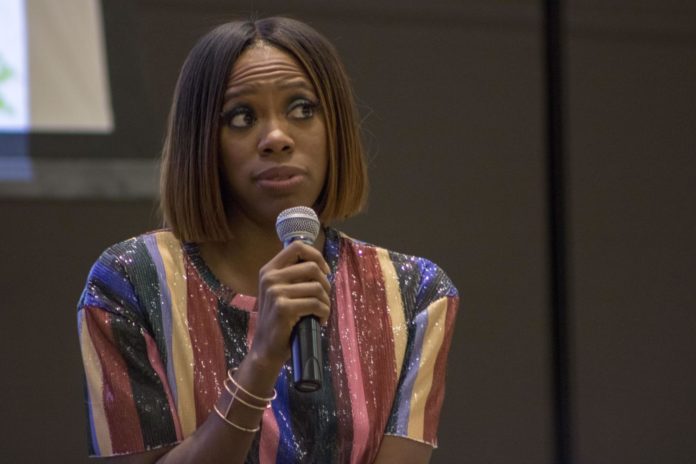Star of HBO’s “Insecure” Yvonne Orji visited Slippery Rock University Monday evening for a conversation about race, religion, and her rise to stardom.
Orji came to America with her parents in 1989 when her mother applied to help fill a national nurse shortage. Yvonne’s shift to life in America did not come easily. Other children, both black and white, would pick on her for her accent and she would come home in tears to a less than sympathetic mother. Orji’s mother responded to her complaints with,”I did not bring you to this county to make friends.”
This didn’t come from a lack of love but rather a very specific idea of what their family had come to America to do, which was to build a better life. Originally Yvonne and her parents agreed the best way for her to do that was to become a doctor. Orji grew up around doctors and nurses with many of her family members in the medical field. Orji said that being a doctor “sounded noble, until I took organic chemistry”.
While getting her Master’s Orji entered a pageant at the request of her brother. While it was out of character, Orji didn’t think much of it, maybe wear a dress, answer some questions, overall it didn’t seem like a big commitment, until two weeks before she had to let the judges know her talent. “I don’t have one, ” Orji said.
With no clear options and little time to learn a talent from scratch, Orji turned to God.
“So I prayed, and I said god help I don’t know what to do, and loud as day I heard the Holy Spirit say ‘Do comedy’ and I was like no,” Orji said.
After wrestling with the idea Orji gave it a chance. She spent the rest of the time before the pageant writing down everything that the audience might find funny in preparation. When the day came, much to her surprise, Orji made people laugh. With this first dive into comedy, Orji realized what it was she wanted to do, now she just had to tell that to her parents.
“God bless my parents, they were just very disappointed,” Orji said. She went on to explain that the arts did not have near the level of support back in Africa as they did in America.
Cindy LaCom, the director of SRU’s Gender Studies program was invited to be the moderator for the discussion. LaCom asked how stereotypes had affected Orji in both her original field of science and later in comedy.
“One thing I’ve seen through everything I’ve done is that when you’re good, all of that kind of gets like sifted away,” Orji responded, “But your response is your responsibility, so you could fight against it, or you could just keep getting better.”








